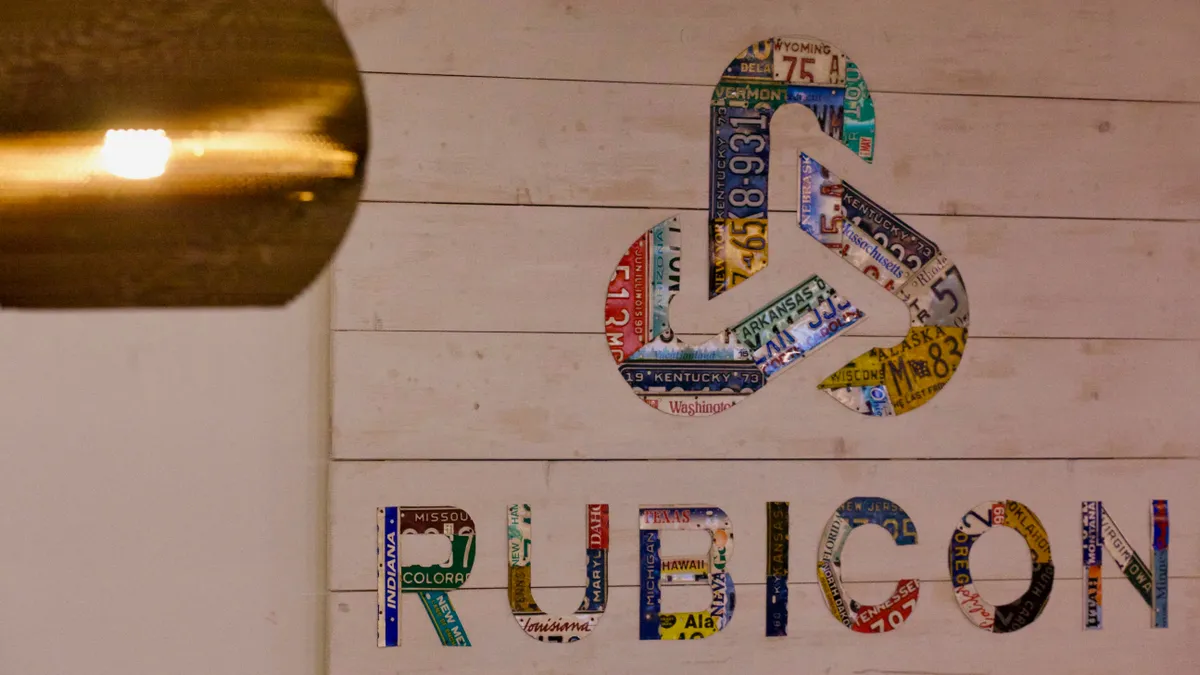If such a thing is possible, Rubicon Global may have gotten more ambitious.
The self-described technology company has never been one to shy away from making big statements — its mission is now "ending waste in all of its forms" — but company executives have seemed newly emboldened in recent months.
CEO Nate Morris has recently taken to projecting the company's timeline even farther than before, and reiterated that in a recent interview.
"I think 50 years from now, when the industry has incorporated all the artificial intelligence and robotics, the deep technology, people are going to look back and say that Rubicon was the catalyst that really changed the industry forever," he said.
Reporting nearly $116.6 million raised in its latest offering round as of May — thanks most recently to $65 million from the New Zealand Super Fund — has surely boosted the "unicorn" B Corp's confidence. The fact that Rubicon has been quietly buying up companies all year without telling anyone could also have something to do with it.
As reported by Fortune's Term Sheet, Rubicon has now acquired three brokers: RiverRoad Waste Solutions, Computerized Waste Systems and WestRock’s waste services division. At the time, Rubicon told Fortune the deals "fit squarely into our portfolio and roadmap," but offered no further comment.
Following the news, sources had the characteristically broad range of reactions that come with any notable Rubicon move.
Was it a way to shore up revenue streams after tough coverage by Fortune and Bloomberg questioned the company's numbers last fall? Was it a sign the company's technology platform was somehow not living up to its potential? Was this further proof that Rubicon is really just a broker — a label the company has vehemently resisted for years — after all?
Few if any private companies in the industry have garnered this much attention while still remaining so opaque. Rubicon launched back in 2008 and made a name for itself by attracting big-name national clients, but many people still didn't quite understand what it was after. Outside of the occasional glossy profiles, with their "Uber of trash" comparisons, Rubicon seemed fine keeping it that way.
That opacity began to change in 2017 with a confrontational appearance at WasteExpo and a list of lawsuits from some of the industry's largest players that continue to play out in various states.
This year, Rubicon has been making news about autonomous collection patents, an exoskeleton prototype, universal recycling labels, 25 "smart city" partners and counting, and plenty else. The company's "Town Haul" podcast covers plastic straws one week and sustainable fashion the next.
Yet for all these projects, it can still be hard to figure out what exactly Rubicon wants for the near-term. A closer look at the company's thinking behind these three recent deals indicates that may be a lot less complicated than it seems.
Turning up the volume
Rubicon has previously described its business as having "three pillars" — its smart cities program, the RubiconPro hauler network and the more well-known collection service via third-party haulers. The company usually declines to clarify whether those pillars are equal parts, or how much revenue each might generate, but it's clear from this latest news that the latter is still Rubicon's bread and butter.
All three of the deals fit directly into that mold, and company executives repeatedly described the moves in such fundamental terms during a recent conversation with Waste Dive.
"Volume controls everything. If you get the volume, you own the industry, and you can deploy and attack, and be more sustainable and dictate how the industry works," said Morris, adding that this also enhances Rubicon's density.
"It's about securing volume so that we have the runway for our technology and our solution. It really is that simple. And in this industry, controlling a critical amount of volume is what commands the respect of the haulers. It's what allows pricing to come down and it's what allows us to get tech penetration to a degree to where we could start to see real impact," said Michael Allegretti, senior vice president of policy and strategic initiatives.
When asked what made these particular three companies attractive, or what they would bring in terms of volume, revenue, customers or any other metrics, the company declined to share specifics.
Morris did mention an oft-cited statistic that Rubicon's small and medium business line — launched in 2016 — grew organically by 300% last year, but the only new metric in a 20-plus-minute call was anecdotal. The word "volume" came up 15 times.
Rubicon also declined to confirm how much it paid for each, though did provide a timeline.
The Computerized Waste Systems (CWS) deal closed on January 31. Industrial Services of America sold CWS to an undisclosed purchaser for $7.5 million in 2015, and Morris confirmed that Rubicon bought it "directly from the founder's family."
Nick Dahm joined Rubicon as vice president of corporate development and strategy in early April and helped close the latest two deals.
Georgia-based WestRock's waste services division was acquired on May 31. The company reported "a $12.3 million gain on the sale of our solid waste management brokerage services business" in its latest 10-Q, though Rubicon maintains that was not the purchase price.
The deal for Charter Waste, the parent company of New Jersey-based RiverRoad, closed on June 30. Charter was sold to a new entity formed through a buyout led by the company's CEO in April 2017 and reported servicing more than 18,000 locations at the time.
According to a February interview with Kentucky's Lane Report, Morris has projected that Rubicon could have close to 5,000 small and medium business customers by the end of this year. While locations and customers are of course different metrics, and Rubicon also has large customers with many locations of their own, this offers an inkling of just how much volume the company might be bringing on.
According to the team, there will be more acquisitions to come but they may not all fit the same mold.
"Part of the reason I came aboard here is to develop a robust pipeline and that's what we've been doing," said Dahm. "It includes targets like these, as well as businesses that are performing data analytics, AI, machine learning — we're even looking at opportunities for hardware."
Another talking point was how Rubicon believes it can be more successful in integrating new companies than others, in part because of its leadership team. Morris mentioned how Kim Rumph, the company's new president, brings significant experience from her time at Brambles Limited. Rumph replaced Elaine Richards, who joined in December 2017.
He also highlighted the ability to learn from newly acquired "generational data sets," applauded Dahm's "disciplined" approach in bringing it all together and took his latest shot at the industry's top companies.
"The big challenge that the big three haulers typically have is they buy a lot of things, but what we see in the field is they're not exactly integrated correctly and they continue to have legacy challenges as a result of failed integration."
The Netflix of trash?
While Rubicon's executives can readily converse in the usual industry terminology, they often seem more comfortable couching things in tech speak about how "data is the new oil," and how that gives it an "advantage against the status quo." Morris also kept returning to the framing of being a technology company that provides customer choice, rather than a utility service with ever-escalating prices, to make his case for Rubicon's future.
"Look, we're not saying anything revolutionary. In every other business line, this model has been successful and we think that it's just the last industry, if you will, on the adoption curve to really receive technology at scale," he said, "and that's what's really exciting."
He emphasized the point by drawing a comparison to other industries where technology platforms can catch on before gaining significant volume — using Airbnb as an example — whereas that hasn't proven to be the case with waste and recycling.
Though for Rubicon it may not really matter whether people subscribe to their interpretation of these three new deals helping accelerate the platform's growth, or choose to take it as yet another sign of the company being a broker more than anything else.
"I was in here with an analyst today, a friend of mine who covers the technology sector, and he asked me about this brokerage question. We were laughing and we said, 'You know, you look back 15 years ago, Netflix was a mail order DVD service. But that's what developed the customer relationships, the data points that they needed to digitize.' That's a very similar proposition here," said Morris. "This is about gaining scale, gaining traction, customer relationships, data, and the ability to continue to digitize the space."
In an industry that's often overlooked compared to others, and usually content to keep it that way, it's no surprise that Rubicon gets the attention it does or that competitors try to downplay it whenever possible. The real question is whether Rubicon can truly deliver on these promises of revolutionary change. Based on its timeframe, none of us may know that answer for years or decades to come.






















